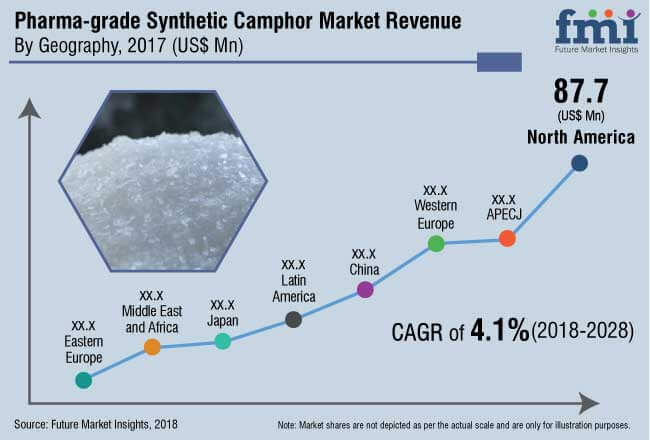
Pharma-grade Synthetic Camphor Market Regional Outlook & Forecast till 2028
According to the latest research by the company, the global pharma-grade synthetic camphor market size is anticipated to be valued at US$ 532.0 Mn, by 2028 end. The report on pharma-grade synthetic camphor market further projects significant growth potential with average year-on-year growth rate pegged at 4.1% through 2028.
Growing demand for topical pain management products is expected to propel the growth of pharma-grade synthetic camphor market. Pharma-grade synthetic camphor is used in many topical analgesic products such as oils, ointments, chest rubs, and gel. These pharma-grade synthetic camphor pain management products are experiencing significant growth due to lesser side effect compare to oral analgesic and expanded retail channel access. Increasing self-medication rate and availability of cost-effective camphor contained OTC analgesic favors the growth of pharma-grade synthetic camphor market growth. Growing incidence of infectious diseases such as cold, flu augmented the use of cold sore remedies, nasal decongestants, topical expectorants etc. which in turn would drive the growth of pharma-grade synthetic camphor market.
Increasing use of private labelled topical products containing camphor push the demand for pharma-grade synthetic camphor. Private label analgesic is gaining popularity in the U.S. market as they do not require FDA approval and strong promotion activities by retailers. Walgreens Ultra Strength Muscle Rub (4% camphor), Salonpas pain relieving patch (1.2% camphor) are the examples of private label analgesic which contain camphor. Surge in commodity export, economic growth and production capacity are expected to boost the growth of pharma-grade synthetic camphor market.
Request For Sample Report @ https://www.futuremarketinsights.com/reports/sample/rep-gb-7564
However, regulatory restrictions on the use of camphor in the medicine of pharmaceutical products would considerably impact the growth of pharma-grade synthetic camphor market. Moreover, increasing raw material prices are expected to hamper the growth of pharma-grade synthetic camphor market. Thus, growing prices of raw materials i.e. alpha pinene or turpentine oil is a major challenge for the manufacturers of pharma-grade synthetic camphor.
Company has segmented the global pharma-grade synthetic camphor market into formulation, application, distribution, and regions. Based on the formulation, pharma-grade synthetic camphor market is segmented into topical and inhalation. The topical segment is expected to represent a highest revenue share in pharma-grade synthetic camphor market as high number of marketed products and vast applications. Applications of pharma-grade synthetic camphor included in the report are respiratory disorders applications, muscular rheumatism, counterirritant & antipruritic and others (topical analgesic, cold sores, minor burns, antifungal, hemorrhoids, topical antitussive & expectorant, astringent, rubefacient, etc.). Others segment expected to contributes highest market value in global pharma-grade synthetic camphor market. Based on the distribution channel, pharma-grade synthetic camphor market is segmented into conventional B2B and online B2B channel. In terms of revenue, conventional B2B segment would hold significant revenue share in pharma-grade synthetic camphor market over the forecast period.
 Pharma-grade Synthetic Camphor Market
Pharma-grade Synthetic Camphor MarketOn the basis of region, the global pharma-grade synthetic camphor market has been segmented into North America, Latin America, Western Europe, Eastern Europe, the Asia Pacific excluding China & Japan, China, Japan, and the Middle East & Africa. North America is expected to contribute highest revenue share in global pharma-grade synthetic camphor market. The demand of pharma-grade synthetic camphor has increased in North America, as increasing production of camphor contained private label and OTC products. China is expected to witness the highest growth rate in pharma-grade synthetic camphor market due to presence of the larger number of pharma-grade synthetic camphor manufactures. Pharma-grade synthetic camphor manufactures are mainly concentrated in China and India and they export their chemicals to the U.S. and Europe. Moreover, due to its growing contribution to the global industry, Asia Pacific is emerging as a focused destination for global manufacturers of camphor and related chemicals.
Report tracks some of the key companies operating in the global pharma-grade synthetic camphor market. Representative players included in the global pharma-grade synthetic camphor market report are Merck KGaA, Oriental Aromatics Limited, Saptagir Camphor Limited, Mangalam Organics Limited, Nippon Fine Chemical Co., Ltd., Rochem International, Inc., Spectrum Chemical Mfg. Corp., Aldon Corporation, Prinova Group LLC. and Fengchen Group Co., Ltd. Manufactures are focusing on improvement of the supply chain which expected to provide huge opportunities to them over the forecast period.
Any Questions, Reach Out To Us @ https://www.futuremarketinsights.com/ask-question/rep-gb-7564
Table of Content
- Executive Summary
1.1. Market Overview
1.2. Market Analysis
1.3. FMI Analysis and Recommendations
1.4. Wheel of Fortune
- Market Introduction
2.1. Market Taxonomy
2.2. Market Definition
- Market Background
3.1. Macroeconomic Factors
3.2. Market Dynamics
3.2.1. Drivers
3.2.2. Restraints
3.2.3. Trends
3.2.4. Opportunity Analysis
3.3. Macroeconomic Assumptions
3.4. Global Economic Outlook
- Key Inclusion
4.1. Global Synthetic Camphor Market Analysis
4.2. Regulatory Scenario
4.3. Pricing Analysis, By Region (2017A & 2028F)
The post Pharma-grade Synthetic Camphor Market Regional Outlook & Forecast till 2028 first appeared on Market Research Blog.
Editor Details
-
Company:
- MARKITWIRED
- Website:
